Articles
- Page Path
- HOME > Restor Dent Endod > Volume 29(3); 2004 > Article
- Original Article The etching effects and microtensile bond strength of total etching and self-etching adhesive system on unground enamel
- Sun-Kyong Oh, Bock Hur, Hyeon-Cheol Kim
-
2004;29(3):-280.
DOI: https://doi.org/10.5395/JKACD.2004.29.3.273
Published online: May 31, 2004
Department of Conservative Dentistry, College of Dentistry, Pusan National University, Korea.
- Corresponding author: Bock Hur. Department of Conservative Dentistry, College of Dentisty, Pusan National University, 1-10 Ami-dong, Seo-gu, Pusan, 602-739, Korea. Tel: 82-51-240-7454, bhur@pusan.ac.kr
Copyright © 2004 Korean Academy of Conservative Dentistry
- 891 Views
- 2 Download
- 2 Crossref
Abstract
-
The purpose of this study was to evaluate the etching effects and bond strength of total etching and self-etching adhesive system on unground enamel using scanning electron microscopy and microtensile bond strength test.The buccal coronal unground enamel from human extracted molars were prepared using low-speed diamond saw. Scotchbond Multi-Purpose (group SM), Clearfil SE Bond (group SE), or Adper Prompt L-Pop (group LP) were applied to the prepared teeth, and the blocks of resin composite (Filtek Z250) were built up incrementally. Resin tag formation was evaluated by scanning electron microscopy, after removal of enamel surface by acid dissolution and dehydration. For microtensile bond strength test, resin-bonded teeth were sectioned to give a bonded surface area of 1mm2. Microtensile bond strength test was perfomed.The results of this study were as follows.1. A definite etching pattern was observed in Scotchbond Multi-Purpose group.2. Self-etching groups were characterized as shallow and irregular etching patterns.3. The results (mean) of microtensile bond strength were SM; 26.55 MPa, SE; 18.15 MPa, LP; 15.57 MPa. SM had significantly higher microtensile bond strength than SE and PL (p < 0.05), but there was no significant differance between SE and PL.
- 1. Buonocore MG. A simple method of increasing the adhesion of acrylic filling materials to enamel surfaces. J Dent Res. 1955;34: 849-853.ArticlePubMedPDF
- 2. Van Meerbeek B, Perdigao J, Lambrechts P, Vanherle G. The clinical performance of adhesives. Review. J Dent. 1998;26(1):1-20.PubMed
- 3. Bouillaguet S, Gysi P, Wataha JC, Ciucchi B, Cattani M, Godin Ch, Meyer JM. Bond strength of composite to dentin using conventional, one-step, and self-etching adhesive systems. J Dent. 2001;29: 55-61.ArticlePubMed
- 4. Perdigão J, Lopes M. Dentin Bonding-Questions for the new millennium. J Adhes Dent. 1999;1: 191-209.PubMed
- 5. Torii Y, Itou K, Hikasa R, Iwata S, Nishitani Y. Enamel tensile bond strength and morphology of resin-enamel interface created by acid etching system with or without moisture and self-etching priming system. J Oral Rehabil. 2002;29(6):528-533.ArticlePubMed
- 6. Hannig M, Bock H, Bott B, Hoth-Hannig W. Intercrystallite nanoretention of self-etching adhesives at enamel imaged by transmission electron microscopy. Eur J Oral Sci. 2002;110(6):464-470.ArticlePubMed
- 7. Hayakawa T, Kikutake K, Nemoto K. Influence of self-etching primer treatment on the adhesion of resin composite to polished dentin and enamel. Dent Mater. 1998;14(2):99-105.PubMed
- 8. Hannig M, Reinhardt KJ, Bott B. Self-etching primer vs phosphoric acid: an alternative concept for composite-to-enamel bonding. Oper Dent. 1999;24(3):172-180.PubMed
- 9. Perdigao J, Lopes L, Lambrechts P, Leitao J, Van Meerbeek B, Vanherle G. Effects of a self-etching primer on enamel shear bond strengths and SEM morphology. Am J Dent. 1997;10(3):141-146.PubMed
- 10. Perdigao J, Geraldeli S. Bonding characteristics of self-etching adhesives to intact versus prepared enamel. J Esthet Restor Dent. 2003;15(1):32-41.ArticlePubMed
- 11. Kanemura N, Sano H, Tagami J. Tensile bond strength to and SEM evaluation of ground and intact enamel surfaces. J Dent. 1999;27: 523-530.PubMed
- 12. Ibarra G, Vargas MA, Armstrong SR, Cobbb DS. Microtensile bond strength of self-etching adhesives to ground and unground enamel. J Adhes Dent. 2002;4(2):115-124.PubMed
- 13. Friedl KH, Hiller KA, Schmalz G. Placement and replacement of composite restorations in Germany. Oper Dent. 1995;20(1):34-38.PubMed
- 14. Mjor IA, Qvist V. Marginal failures of amalgam and composite restorations. J Dent. 1997;25(1):25-30.ArticlePubMed
- 15. Opdam NJ, Roeters FJ, Feilzer AJ, Smale I. A radiographic and scanning electron microscopic study of approximal margins of Class II resin composite restorations placed in vivo. J Dent. 1998;26(4):319-327.PubMed
- 16. Kugel G, Ferrari M. The science of bonding: from first to sixth generation. Review. J Am Dent Assoc. 2000;131: Suppl. 20S-25S.PubMed
- 17. Hayakawa T, Kikutake K, Nemoto K. Related Articles, Influence of self-etching primer treatment on the adhesion of resin composite to polished dentin and enamel. Dent Mater. 1998;14(2):99-105.PubMed
- 18. Retief DH. Clinical applications of enamel adhesives. Review. Oper Dent. 1992;Suppl 5: 44-49.PubMed
- 19. Pashley DH, Tay FR. Aggressiveness of contemporary self-etching adhesives. Part II: etching effects on unground enamel. Dent Mater. 2001;17(5):430-444.PubMed
- 20. Ripa LW, Gwinnett AJ, Buonocore MG. The 'prismless' outer layer of deciduous and permanent enamel. Arch Oral Biol. 1966;11: 41-48.ArticlePubMed
- 21. Whittaker DK. Structural variations in the surface zone of human tooth enamel observed by scanning electron microscopy. Arch Oral Biol. 1982;27(5):383-392.ArticlePubMed
- 22. Nathanson D, Bodkin JL, Evans JR. SEM of etching patterns in surface and subsurface enamel. J Pedod. 1982;7(1):11-17.PubMed
- 23. Cehreli ZC, Altay N. Effects of a non-rinse conditioner and 17% ethylenediaminetetraacetic acid on the etch pattern of intact human permanent enamel. Angle Orthodont. 2000;70: 22-27.PubMed
- 24. Mcintyre J. In: Mount GJ, Hume WR, editors. The nature and progression of dental caries. Preservation and Restoration of Tooth Structure. 1998;London: Mosby Inernational Ltd; 9.
- 25. Itou K, Torii Y, Suzuki K, Inoue K. Adhesion of restorative resin to tooth-adhesion promotes by Liner Bond III. Adhesive Dent. 1994;12: 174.
- 26. Pashley DH, Carvalho RM. Dentine permeability and dentine adhesion. J Dent. 1997;25(5):355-372.ArticlePubMed
- 27. Gwinnett AJ. The ultrastructure of the "prismless" enamel of permanent human teeth. Arch Oral Biol. 1967;12: 381-388.PubMed
REFERENCES
Tables & Figures
REFERENCES
Citations
Citations to this article as recorded by 

- Physical properties of different self-adhesive resin cements and their shear bond strength on lithium disilicate ceramic and dentin
Hye-Jin Shin, Chang-Kyu Song, Se-Hee Partk, Jin-Woo Kim, Kyung-Mo Cho
Journal of Korean Academy of Conservative Dentistry.2009; 34(3): 184. CrossRef - Effects of one or two applications of all-in-one adhesive on microtensile bond strength to unground enamel
Chang-Yong Son, Hyeon-Cheol Kim, Bock Hur, Jeong-Kil Park
Journal of Korean Academy of Conservative Dentistry.2006; 31(6): 445. CrossRef
The etching effects and microtensile bond strength of total etching and self-etching adhesive system on unground enamel
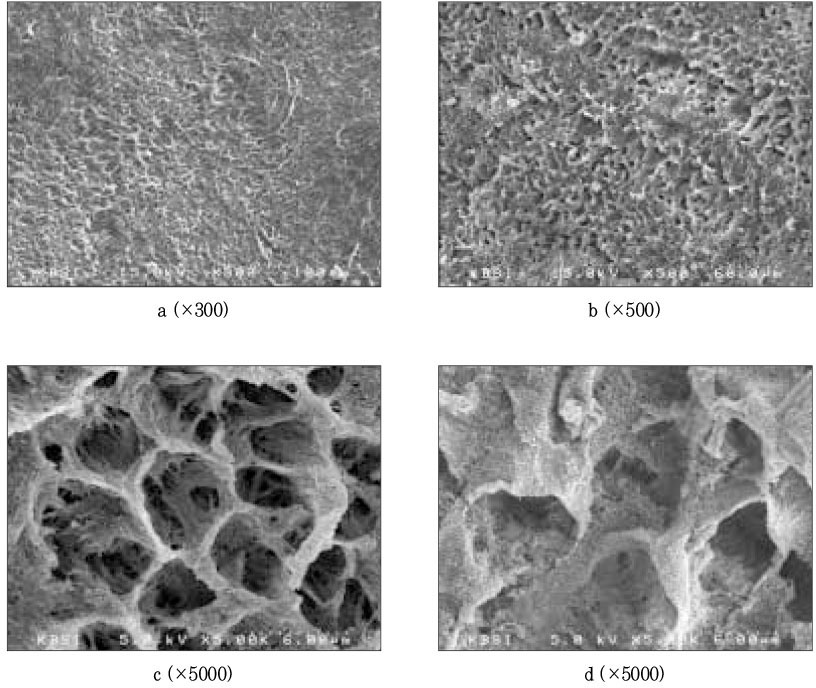
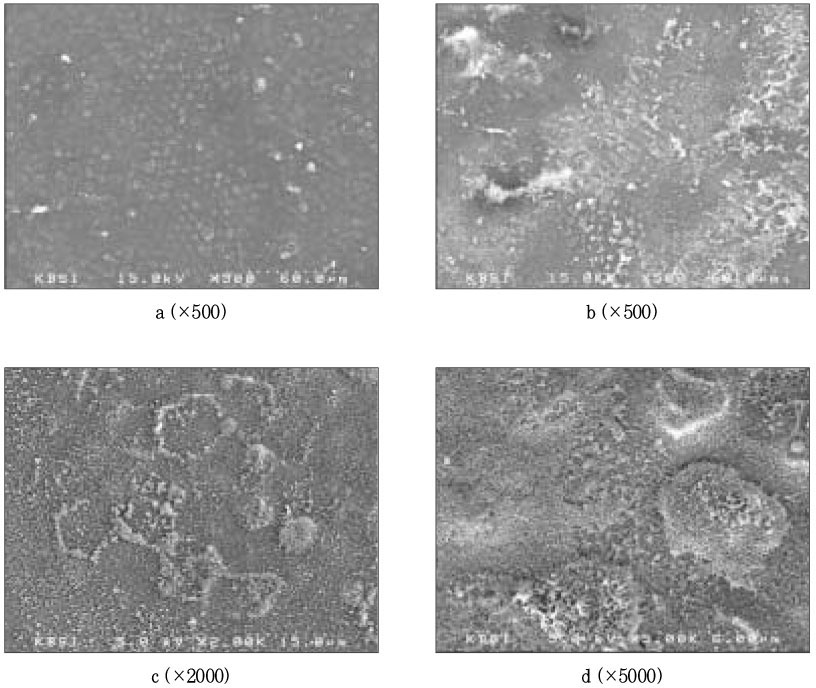
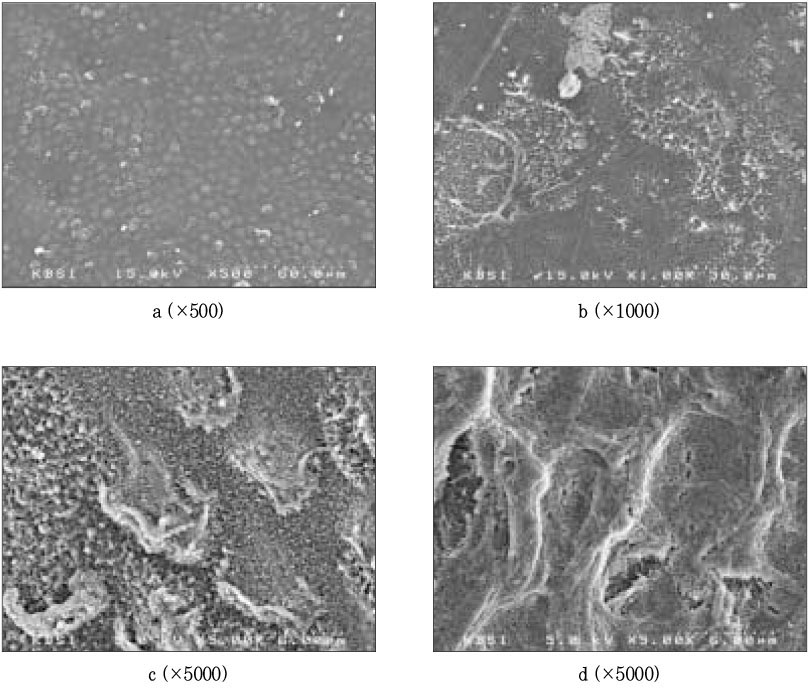
Figure 1
The SEM photographs of resin replica using Scotchbond Multi-Purpose
Figure 2
The SEM photographs of resin replica using Clearfil SE Bond
Figure 3
The SEM photographs of resin replica using Adper Prompt L-Pop
Figure 1
Figure 2
Figure 3
The etching effects and microtensile bond strength of total etching and self-etching adhesive system on unground enamel
Composition of three dentin bonding systems
Procedures of bonding agent application
Microtensile bond strengths(MPa, Mean ± SD)
Table 1
Composition of three dentin bonding systems
Table 2
Procedures of bonding agent application
Table 3
Microtensile bond strengths(MPa, Mean ± SD)

 KACD
KACD



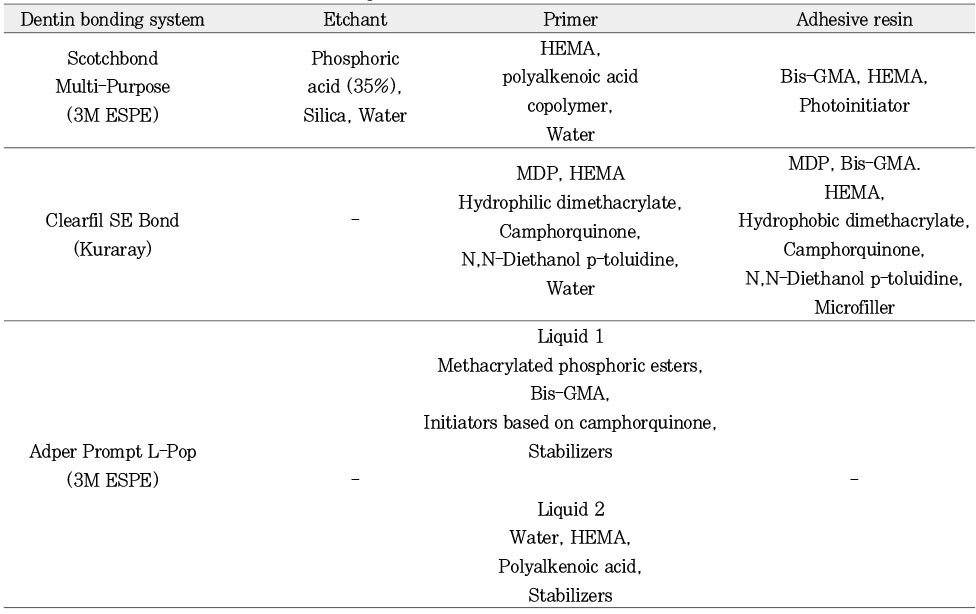
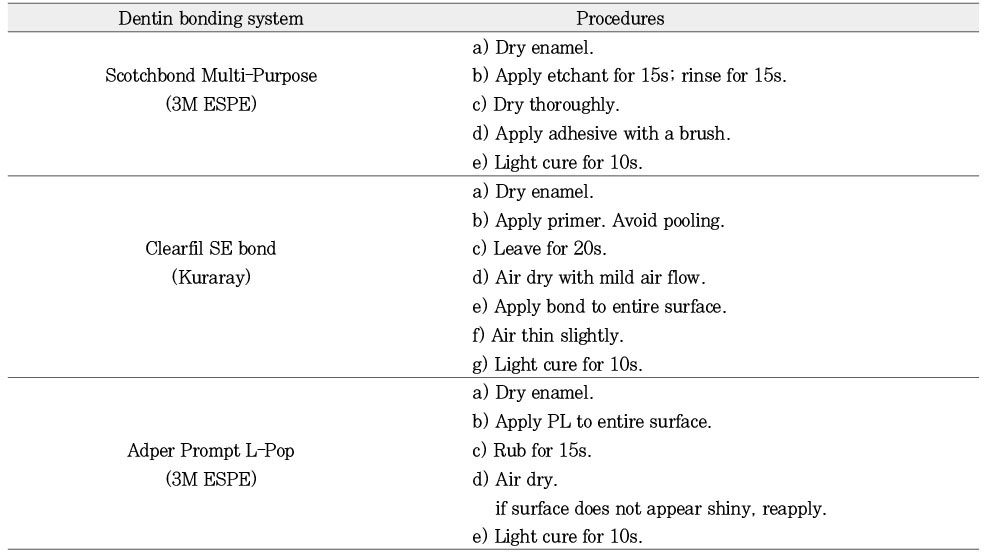

 ePub Link
ePub Link Cite
Cite

